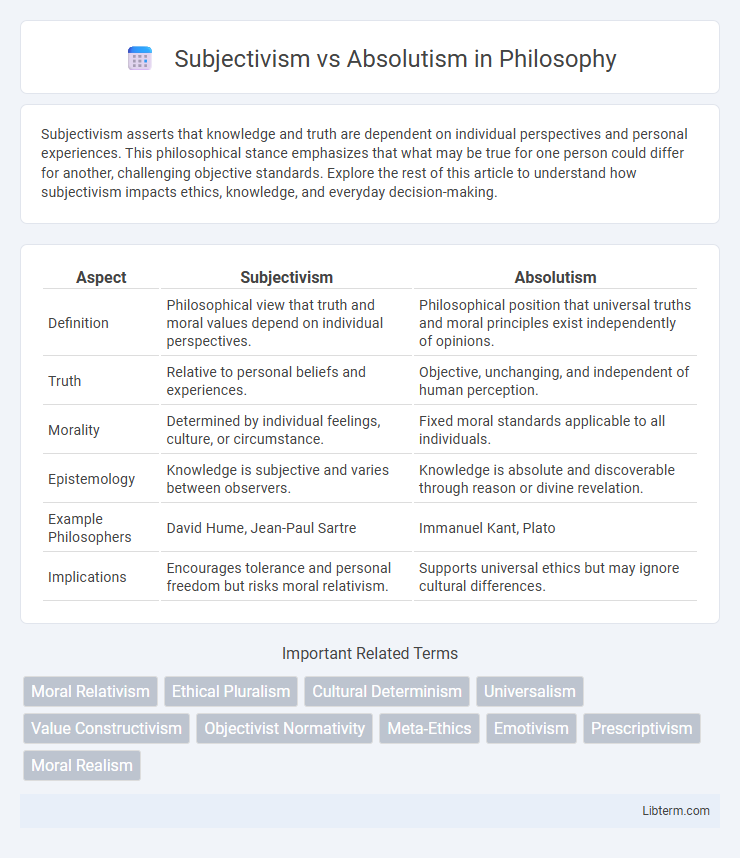Subjectivism asserts that knowledge and truth are dependent on individual perspectives and personal experiences. This philosophical stance emphasizes that what may be true for one person could differ for another, challenging objective standards. Explore the rest of this article to understand how subjectivism impacts ethics, knowledge, and everyday decision-making.
Table of Comparison
| Aspect | Subjectivism | Absolutism |
|---|---|---|
| Definition | Philosophical view that truth and moral values depend on individual perspectives. | Philosophical position that universal truths and moral principles exist independently of opinions. |
| Truth | Relative to personal beliefs and experiences. | Objective, unchanging, and independent of human perception. |
| Morality | Determined by individual feelings, culture, or circumstance. | Fixed moral standards applicable to all individuals. |
| Epistemology | Knowledge is subjective and varies between observers. | Knowledge is absolute and discoverable through reason or divine revelation. |
| Example Philosophers | David Hume, Jean-Paul Sartre | Immanuel Kant, Plato |
| Implications | Encourages tolerance and personal freedom but risks moral relativism. | Supports universal ethics but may ignore cultural differences. |
Defining Subjectivism: Key Concepts
Subjectivism asserts that knowledge, truth, and morality are contingent upon individual perceptions and experiences, emphasizing personal perspective as the basis for understanding reality. This philosophical stance holds that what is considered true or right varies between individuals, rejecting universal or objective standards. Key concepts include the relativity of truth, the influence of emotions and beliefs on judgment, and the prioritization of subjective experience over external validation.
Understanding Absolutism: An Overview
Absolutism asserts that certain truths or moral principles are universal and unchanging, regardless of individual beliefs or cultural differences. This philosophical stance emphasizes objective standards that govern ethics, law, and knowledge, rejecting personal perspectives as valid measures of reality. Understanding absolutism requires recognizing its foundation in objective reality and universal values that guide consistent decision-making across diverse contexts.
Historical Origins of Subjectivism and Absolutism
Subjectivism traces its historical origins to early modern philosophy, notably in the works of Rene Descartes and later David Hume, who emphasized individual perception and experience as the foundation of knowledge and morality. Absolutism, rooted in political theory and ethics, emerged prominently during the reign of Louis XIV and in the works of Thomas Hobbes, advocating for centralized, unequivocal authority and objective moral laws applicable universally. These contrasting foundations highlight subjectivism's focus on personal perspective versus absolutism's emphasis on universal, unchanging truths.
Major Philosophers and Their Contributions
Subjectivism, championed by thinkers like David Hume and Jean-Paul Sartre, emphasizes individual perception and experience as the basis of truth and morality, arguing that knowledge and values are inherently personal and context-dependent. Absolutism, defended by philosophers such as Immanuel Kant and Plato, asserts that objective, universal truths and moral principles exist independently of human opinions or beliefs. Kant's categorical imperative and Plato's theory of Forms represent foundational contributions to absolutist ethics, while Hume's empiricism and Sartre's existentialism underscore subjectivism's reliance on human subjectivity and freedom.
Ethical Dilemmas: Subjectivist vs Absolutist Approaches
Subjectivist approaches to ethical dilemmas emphasize personal beliefs and cultural context, viewing morality as relative and flexible, which can lead to varied interpretations of right and wrong. Absolutist perspectives maintain that certain ethical principles are universally valid and unchanging, providing clear, consistent standards for resolving moral conflicts. The contrast between subjectivism and absolutism often shapes how individuals and societies justify decisions in challenging ethical situations.
Strengths and Critiques of Subjectivism
Subjectivism emphasizes individual perspectives in moral judgments, fostering personal autonomy and moral diversity, which encourages tolerance and adaptability in complex social contexts. Critics argue subjectivism lacks universal moral standards, leading to potential ethical relativism where conflicting viewpoints cannot be objectively resolved. Its strength lies in acknowledging personal experience as valid, while its weakness is the absence of consistent, enforceable moral principles across different cultures or situations.
Strengths and Critiques of Absolutism
Absolutism offers clear, consistent moral guidelines that promote social order and universal accountability by asserting objective truths independent of individual opinions. Its strength lies in providing a stable ethical framework that aids in resolving conflicts and establishing laws applicable to all. However, critiques highlight its rigidity and potential insensitivity to cultural diversity, as absolutism may suppress important contextual nuances and moral pluralism in complex situations.
Real-World Implications and Case Studies
Subjectivism, emphasizing individual perspectives in moral judgments, often leads to diverse interpretations of ethical issues in multicultural societies, complicating the creation of universal laws. Absolutism asserts fixed moral truths applicable across contexts, providing a stable framework for legal systems but occasionally clashing with cultural relativism and personal freedoms. Case studies such as international human rights debates reveal tensions between respecting cultural differences (subjectivism) and enforcing universal standards (absolutism), influencing policy-making and global diplomacy outcomes.
Bridging the Gap: Can Subjectivism and Absolutism Coexist?
Subjectivism and absolutism represent contrasting approaches to truth, with subjectivism emphasizing personal perspectives and relativism, while absolutism asserts unchanging, universal truths. Bridging the gap requires recognizing that subjective experiences can inform absolute principles, allowing for a dynamic interplay where contextual understanding enriches fixed moral or factual standards. This coexistence fosters a balanced framework in ethics and epistemology, accommodating individual interpretations within overarching, stable truths.
Conclusion: The Ongoing Debate and Its Relevance
Subjectivism and absolutism continue to shape ethical discourse, reflecting diverse perspectives on moral truths. Subjectivism emphasizes individual experience and cultural context, while absolutism asserts universal moral principles valid across all situations. The ongoing debate remains crucial for navigating complex moral dilemmas in law, politics, and personal decision-making.
Subjectivism Infographic

 libterm.com
libterm.com